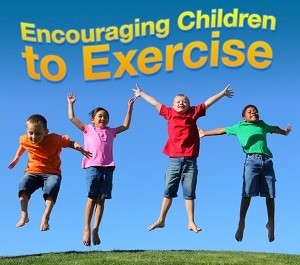
How do we encourage kids to exercise and move when life in modern society has become sedentary, and we are much to blame?
With innovation and technological advancements, we basically obtain almost NO physical activity throughout our day. Unlike our ancestors, who had to struggle to find food or make household necessities, we conveniently drive a car to a large store and buy whatever food and household supplies that store decides to sell us without ever having to hunt, shoot, gather, grow stuff, or build anything. Hunting, fishing, building…. once essential skills needed to survive and maintain a family, have become recreational activities (in which most do not engage). The majority of people spend working and leisure time sitting stationary….sitting at desks, in front of computer screens, smartphones, tablets, TVs. Then after all this sitting, we travel everywhere by motorized vehicles.
It is no wonder rates of obesity are higher than ever before.
We almost have to go to a gym to get some actual exercising done.
Through trial and error and much research, we know a sedentary life is not good for our health in general, but what exactly does it do to our brains?
 The answer….Everything. The research is conclusive: physical exercise directly impacts how well we learn, and kids who exercise are able to become smarter with less effort.
The answer….Everything. The research is conclusive: physical exercise directly impacts how well we learn, and kids who exercise are able to become smarter with less effort.
In his book, Spark, The Revolutionary New Science of Exercise and the Brain, Harvard Psychiatrist Dr. John Ratey notes drastic academic improvements in students who add daily exercise to their learning schedule.
Consistent, daily exercise results in significantly improved concentration, learning and test scores.
The first school to demonstrate the relationship between vigorous physical exercise and learning ability was a school in Naperville, Illinois, just outside Chicago. Naperville’s students follow a rigorous exercise regimen and consistently turn out some of the smartest students in the country. In fact, in 1999, Naperville students competing against 230,000 students from around the world in an international Math and Science test scored sixth in math and first in the world in science. Here is an article on the school.

One teacher found out first-hand. She taught inner-city children with behavioral challenges and read a few studies linking exercise to increase attention/retention and learning. She was so convinced that her administration granted her the use of treadmills in her classroom. She had her students spend the first 20 minutes of her 40 minute class moving and getting oxygen and blood flowing. Then she gave her class lesson the last 20 minutes of her class. Even though her teaching time was cut in half, her students’ learning and retention increased significantly, followed by dramatic improvements in academic scores and a decrease in disciplinary incidents. In four months, her students’ reading, writing, and math all increased by almost 40%. Even the students themselves started looking forward to her classes and explained that they felt happier and smarter.
So What Is Going On?
How can something as simple as regular exercise actually make you smarter and ‘strengthen’ the brain much like it can strengthen muscles?
At a molecular level, exercise improves learning by:
- increasing the brains capacity to concentrate as well as its ability to process and retain more information.
- promoting the release of specific neurotransmitters, hormones, and growth factors that promote the learning process.
- promoting the growth of new brain cells, or neurogenesis
Thus exercise provides people with more brain cells and increases the factors that help those brain’s cells make connections, and enables people to concentrate better so they can accomplish the work of learning easier.
If you are a student, a teacher, a parent of a student or any of the combinations, exercise should be a top priority.

As parents we are responsible for teaching our children the value of health and fitness which includes learning how to incorporate daily activity. We take great importance in teaching them how to behave responsibly, choose nutritious foods wisely, adequately maintain personal hygiene, and achieve a proper sleep/play balance. No matter how many times your child might tell you they don’t want to brush their teeth or go to bed, as responsible parents we find ways of reinforcing and modeling the correct behavior. Exercise should be no different.
Sooo….what are you waiting for……
Introduce exercise programs into your children’s routine and discover the direct impact on their academic outcomes.



